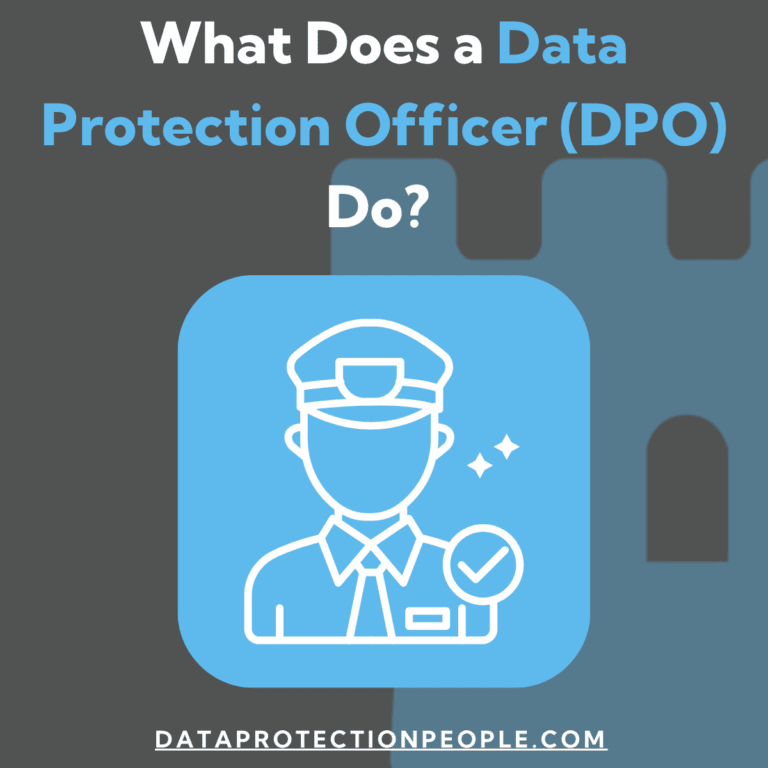What Does a Data Protection Officer (DPO) Do?
Data Protection People
Discover the essential tasks of a DPO, from advising management to liaising with the Information Commissioner.

The UK GDPR is a complex piece of legislation. You can try to understand the legalese and juggle your requirements along with your day-to-day role, or you can appoint a DPO.
A data protection officer is an independent expert responsible for keeping your business compliant with the law. Compliance underpins everything they do. That’s why companies choose to outsource their DPO to avoid a conflict of interest.
In this article, we will uncover the DPO requirements as set out in:
- Part 3, Chapter 4 of the Data Protection Act (2018)
- Articles 37-39 of the GDPR
1. What Are the Tasks of a DPO?
A data protection officer must perform the following tasks:
- Provide Guidance to Management & Employees
- Improve & Monitor GDPR Compliance
- Advice on Data Protection Impact Assessments
- Cooperate with the Commissioner
- Become the Commissioner’s Main Point of Contact
- Provide Guidance to Management & Employees
A DPO informs and advises the data controller (the business), its employees and any data processors that handle personal data on its behalf.
As a GDPR expert, the DPO will keep these parties aware of their obligations under the UK GDPR, along with other data protection laws relevant to the controller’s operations. For example, if you transfer data from one country to another, your DPO will hold you accountable to both the UK GDPR and the country’s legislation.
The Data (Use and Access) Act (DUAA) 2025 is simplifying international data transfer – find out more in our guide.
A DPO is a purely advisory role, so they can’t make decisions for you. As a controller, you can even choose to reject their advice, but it would be wise to implement it or face the repercussions later on.
2. Monitor GDPR Compliance
Along with advising, a DPO also monitors compliance with the UK GDPR and other data protection laws. This includes:
- Ensuring the relevant data protection policies are implemented and raising awareness of them
- Assigning responsibilities under those policies
- Bringing attention to data protection concerns
- Conducting or overseeing data protection training
- Conducting internal GDPR audits
- Managing data protection obligations
By completing these tasks, a DPO ensures your business maintains – or improves – its compliance with the UK GDPR.
3. Advise on Data Protection Impact Assessments (DPIA)
Businesses that require a DPO are typically those with high-risk and/or large-scale processing activities. At times, these businesses will need to complete a risk assessment, otherwise known as a DPIA, when starting a new processing activity.
A data protection impact assessment is required by law only if:
- You process special category and criminal conviction data on a large scale.
- You systematically monitor public areas on a large scale.
- You plan to use automated decision-making to conduct systematic and extensive evaluations of an individual. For example, you may use software to automatically filter job applications based on a specific criteria.
The ICO also include several other high-risk activities that may require a DPIA, which are not included above.
The DPO is expected to advise and monitor these assessments, but not complete them on your behalf. Remember, DPOs are advisors, not ‘doers’. That is, unless they are an existing employee who may be spinning multiple plates to move compliance work over the line.
4. Cooperate & Liaise with the Commissioner
The DPO must be a point of contact for the Information Commissioner (or ‘ICO’) on all data protection issues. This includes reporting on data breaches, subject access requests (SARs), and any other concerns related to non-compliance.
A DPO operates independently, so while performing a task like this could jeopardise your business, you cannot dismiss or penalise them for doing so. It’s part of their job. This proactivity will help you avoid fines later down the line.
5. Serve as the Point of Contact for Data Subjects
A DPO must also be the designated contact for individuals whose data is being processed. These individuals are known as data subjects and could be your employees or customers.
When an individual submits a SAR, a data protection officer will handle the communication between the business and the person. The DPO will also guide the controller on collating and reviewing the requested information, ensuring the final response is delivered in a timely manner.
Can a Data Protection Officer Carry Out Other Tasks?
Yes, if you have an internally appointed DPO, they can carry out other duties. These duties or tasks, however, must not result in a conflict of interest.
If a DPO has two roles, the organisation must ensure that there are rules implemented to avoid or minimise conflict of interest. You must assess what each role entails and be prepared to provide evidence of why you have done so.
What Are an Employer’s Duties When Appointing a DPO?
As an employer, you must create an environment that allows your DPO to:
- Report to the highest management level of the controller
- Participate in all matters related to personal data protection in a timely manner.
- Be provided with the necessary resources to perform their tasks and maintain their expertise in data protection law and practice.
- Be able to act independently, without receiving any instructions regarding their data protection tasks.
- Avoid conflicts of interest by not performing any other tasks that would create one.
- Not to be dismissed or penalised for performing their official duties
Is Your Business Fully GDPR Compliant? Speak to Our Outsourced DPOs Today
Our outsourced data protection officers bring extensive knowledge in all areas of the UK GDPR. You can choose to outsource all your DPO obligations, or they can work alongside your team to fill in the gaps.
We offer a range of services to meet business requirements, so please get in touch to see how we can help.
